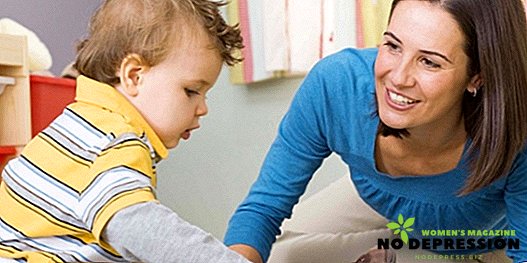Proper upbringing of a child is a guarantee of his happy future and harmoniously developed personality. It is not always possible to find a common language and those psychological techniques necessary for the upbringing of a small person.
In this article you will find the answer to the question - how to raise a child? First we turn to psychology.

Psychological principles of parenting
There are a number of psychological principles necessary for the successful formation of the personality:
- It is important to understand that the child, because of his age, is still not emotionally stable. He reacts to environmental events and phenomena much brighter than adults. A minor event for an adult can be a huge shock for a child. Therefore, it is worth paying close attention to a sharp change in the mood of the child, and, if necessary, reassure him;
- in the life of the baby the leading place is occupied by the parents. In connection with this huge role, one should closely monitor not only one’s behavior, but one’s own words as well. Children often copy the behavioral traits of their parents;
- the more parents communicate with the baby, the better. You should take part in his life, talk to him, give advice. Friendship between family members should be central to family relationships;
- It should also be remembered that joint games and activities have a beneficial effect on the microclimate in the family. When a child sees that parents are seeking to spend time together, the child feels necessary and important.
Rules of education of the baby from birth to one year
In the period of up to a year, at the time of development and maturing of the baby, he lays down the basic habits, behavioral traits. During this period, the baby is emotionally and physically connected with the mother and above all needs her constant care. How to raise a child from birth?
So, from 2 weeks of life of a child, his education should start, which has 4 periods:
- From birth to three months. It is necessary to talk with the baby, smile at him, sing songs to him, tell poems. The voice at this moment should be soft and caring. All this contributes to the development of speech and the early development of a culture of communication;
- From three to six months. During this period, hearing, sensory perception of the baby and visual development are actively developed. The child should include listening to music, children's songs, classics. The baby should also be introduced to the outside world: show different objects, pictures;
- From six to nine months. At this time, the cognitive activity in children increases. It is worth allowing the child to crawl around the apartment on his own, to study his surroundings, of course, under the supervision of his parents. At this time, it is also worth instilling the rules of hygiene: to accustom to the bib, to wash the pens before eating;
- From nine months to a year. At this age, the baby is most active. At this stage, you need to acquaint him with the properties of things: water is liquid, the ball jumps, the machine can be rolled on the floor. Undesirable actions should be stopped with a soft but sure word “not”. For harmonious development of speech is to communicate as much as possible with the child.

How to raise a one-year-old child
At that moment, when the child’s age reaches 11-12 months, its formation, both psychological and physical, begins to develop more rapidly. At this age there is an important stage in the formation of the future personality.
The child at this time is still emotionally connected with the mother, but gradually begins to master the world around.
For successful education in this time period, you must adhere to the following rules:
- actively build a system of prohibitions and incentives. At this age, the baby will begin to understand what he is allowed to do and what is not;
- when the child begins to be capricious, you should not raise your voice to it. The best solution will be the substitution reaction: you need to switch the attention of the child to something that can distract him;

- playing with the baby, it is necessary to replace the action demonstrations with reciprocal actions in which the parent directly participates in the game;
- the baby gradually begins to show independence, he himself can decide exactly what kind of activity he wants to do at the moment. It is important not to hinder such manifestations.
Many parents are faced with the fact that the baby becomes more capricious and sensitive during the one-year period. This is due to the fact that the boundaries of his interests are gradually expanding and he is learning to look at the world in a new way.
It should be understood that such a regression in behavior is not constant and will soon pass.
How to raise a child in 2-3 years
The leading activity at this age is the game. The authority among adults is still parents. The child at this moment experiences an important stage for him - the formation of a personality.
This is manifested through the so-called "crisis of three years." For proper upbringing in this period it is necessary:
- limit the child from more prohibitions, give him the opportunity to make his choice. In situations where the baby is capricious and does not want to do something, you should not force him. It must be put in the situation of choice. For example, he is hungry, but picky and refuses to eat. He should offer a choice of two or more dishes. Most likely, the baby will make his choice and calm down, since at that moment he was allowed to act as an adult;
- it is important not to lose composure and not to give in to emotions at the moments when the child is hysterical. In a calm, even tone, it is necessary to clearly and convincingly explain your position;
- should talk to the baby as an adult. No need to use diminutive words and distort speech. Firstly, it contributes to the child’s speech development, and secondly, the baby will feel like an adult.

Education at the age of 4-5 years
The behavior of the child becomes more conscious, meanwhile his upbringing is more difficult. At this age, the child is already a separate person and it is worth to treat his wishes and interests with understanding. It is important to continue active interaction with him, as well as adhere to some rules:
- should pay more attention to mental and creative development. This is facilitated by joint classes in drawing, singing, modeling, needlework, etc .;
- team games should become regular. It is important for children to feel the active participation of parents in all areas of their lives;

- at the age of 4-5 years, children begin to more consciously learn the norms of social and social rules of behavior. It is necessary to tell how to behave in this or that situation;
- one should also be willing to respond to any "why" of the children who know the world. It is important to do this without irritation, with a smile. Show interest in his desire to learn as much as possible. Due to this, the child will learn that parents are always ready to help and will answer any of his questions. This ensures that as a teenager he will trust his family and come to his parents for advice and help.
Tips for raising children 6 years and older
The influence of parents during this period on the behavior of children decreases slightly. This is due to the fact that parents are now not the only authoritative people in their environment. A social unit such as teachers and friends appears.
The peak of this is achieved at the stage of "transitional age", when friendship with a teenager in the first place.
Therefore, it is important not to try to severely restrict the freedom of the child, put pressure on him and force him. It is important to maintain a harmonious and trusting relationship. Trust is a key point in communication between the child and the parents at this time.
| Age | Authority level | ||
|---|---|---|---|
| parents | teachers | friends | |
| 6-9 | 1 | 2 | 3 |
| 9-14 | 1 | 3 | 2 |
| 14-17 | 2 | 3 | 1 |
Given all this, you should follow a few simple rules to build a trust relationship:
- more often talk with the child, ask about his successes and affairs;
- support in his quest for independence;
- if he doesn’t succeed, do not scold him for that at all. It should be the other way around to help sort out the problem, advise ways to solve it;
- involve in joint affairs and activities.

How to raise a personality
Personality and character are formed in children under 5 years of age. Therefore, it is extremely important to lay the foundation of personal qualities at an early age.
First of all, it is worth supporting the child. This is especially true of situations where something is not working out for him.
After all, it often happens that the negative behavior of parents at such times contributes to the fact that the child becomes withdrawn into himself and ceases to trust his parents. Therefore, open communication within the family is significant.
It should also give considerable freedom of choice. Do not forget that the child must have their responsibilities. For example, cleaning your room and taking care of indoor plants. This will bring responsibility and autonomy.
For the harmonious development of the personality, it would not be superfluous to record the child in various sections and circles. They can be both creative and sports. But here it is important to listen to the opinion of the child, do not put pressure on him and in no case impose his opinion on him.
The key components of the relationship between children and parents should be:
- The trust;
- Joint pastime;
- Close friendly communication;
- Personal space;
- Freedom of choice;
- Lack of physical punishment and increase in voice;
- Judicious conversations;
- Joy and praise for achievements and successes.
How not to raise children
It is not always enough to take into account advice on how to properly raise a child, sometimes it is useful to learn about those things that are not acceptable in education. Often, many people do not even notice the mistakes they make.
All this comes from ignorance, generally accepted stereotypes and how parents themselves were raised in childhood. Examples of how not to raise children include situations where parents:
- not interested in the affairs and success of children in school;

- do not help with homework;
- do not pay due attention;
- create a rigid system of restrictions (do not let go for a walk, prohibit playing computer games, etc.);
- they do not encourage even the smallest successes;
- for the purposes of upbringing, physical force is used (they use a belt for punishment, etc.);
- raise your voice;
- impose their point of view;
- restrict freedom of choice;
- Replaced communication gadgets.
In addition, parents do not know that in order to form a trusting relationship between the child and the parents, it is necessary to develop the emotional intelligence of children.
Similarly, it is worth describing the mood of the child, using the phrases: "you are distressed," "I see that you are going through," "you really want to walk, but it's too late. You are upset that we will not let you go for a walk."
Good luck in raising children!
And a few more tips on raising a baby - in the next video.















